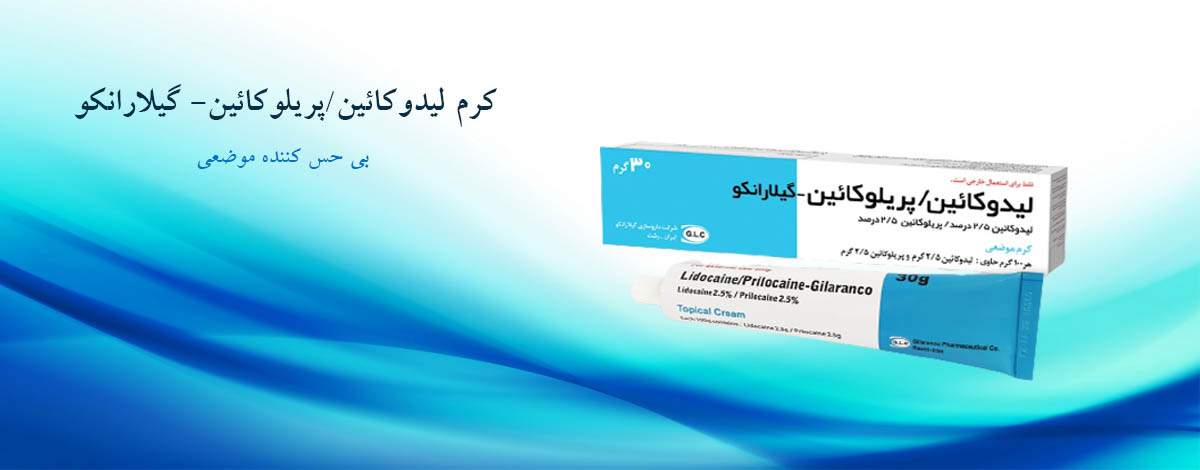Lidocaine 2.5% / Prilocaine 2.5%
Drug Category: Local Anesthetic
Indications
Lidocaine/Prilocaine cream is used to create short-term local anesthesia on healthy skin. This medicine is prescribed for your current disease, so do not use it in similar cases or recommend it to others.
Consumption Instruction
The exact way to use is notified by a doctor or prescriber, but general information to use is as follows:
- Use on healthy skin or mucosa.
- Use the cream as a thin layer on skin and if recommended by a doctor, coat the applied area with a layer of plastic or suitable cover. This layer is removed from the skin immediately before starting the procedure, and the remaining cream on the skin is also removed before the process.
Consumption Table
|
Age
|
Consumption |
Dosage |
Duration of skin contact |
Frequency of use
|
|
Adults and people over 12 |
Anesthesia for small operations |
2 gr. |
At least an hour Maximum 5 hours |
As required |
|
Adults and people over 12 |
Consumption in the genital area |
2 gr. |
Less than 5 minutes |
As required |
|
Newborn 0-2 months |
Injections or small operations |
1 gram (less than 10 cm2 covering the skin of the body) |
Less than an hour |
Maximum once a day |
|
Infants 3-11 months |
Injections or small operations |
Maximum 2 grams (less than 220 cm of body skin coverage) |
Less than an hour |
2 times a day |
|
Children 1-5 years old |
Injections or small operations |
Maximum 10 grams on the whole skin (less than 100 cm2 of the surface) |
Less than an hour |
Maximum 2 times a day |
|
Children 6-11 years old |
Injections or small operations |
Maximum 10 grams on the whole skin (less than 200 cm2 of the surface) |
1 hour (maximum 5 hours) |
Maximum 2 times a day |
Prohibited Usage
1- Allergy to prilocaine and lidocaine or any of the components of the formula
2- Use inside the eye
3- Use inside the ear
4- In G6PD enzyme deficiency and premature children less than 37 weeks and children less than 12 months who have methemoglobinemia.
Warnings
1- Prevent contact with eyes.
2- Used only on intended area.
3- Before using, inform your doctor or pharmacist about the following cases:
- In case of Glucose 6-phosphatase enzyme deficiency (favism)
- If you have skin allergies (Atopic dermatitis).
- Cuts, open sores, acne
- If you are taking drugs that regulate the heart rate, such as amiodarone and sotalol.
4- Due to the lack of information and research, it should not be used in the genital area of children under 12 years old.
5- It should not be used in children under 12 months who are taking methemoglobinemia inducing drugs.
6- Lidocaine/prilocaine cream should be used with caution in patients who are taking class I cardiac antiarrhythmic drugs such as tocainide and mexiletine. Because this medicine strengthens the effect of heme and causes toxic medicinal effects.
Drug Interactions
Simultaneous use with methemoglobin-inducing drugs such as nitrates. Local anesthetics, antibiotics such as dapsone, sulfonamides and antimalarial drugs such as chloroquine and primaquine, nitrofurantoin.
Anticonvulsant drugs such as phenobarbital, phenytoin sodium valproate and other drugs such as acetaminophen, metoclopramide, sulfasalazine and clonidine which lead to drug interactions.
Use in Pregnancy
Although the absorption of lidocaine-prilocaine is very low, it should be used with the advice and consultation of a doctor.
Consult your doctor before use during breastfeeding because a small amount of Lidocaine and prilocaine goes in milk.
Side Effects
1- In case of the following symptoms, contact the doctor immediately:
Skin color change due to lack of oxygen, shortness of breath, decrease in blood pressure and change in heart rate
2- Common side effects that generally occur in the use of local anesthetics includes:
Mild skin reaction such as burning sensation or itching and transient redness and swelling of the skin.
3- Uncommon side effects such as skin irritation and feeling of heat at the place of drug use.
4- Rare side effects such as allergic reactions that may lead to anaphylaxis shock, blood reactions, methemoglobinemia, petechia at the place of use.
Maintenance
- Keep out of reach of children
- Store at a temperature below 30°C
- Protect from freezing
References
1- PDR.net
2- FDA label Approved

 English
English  فارسی
فارسی  Arabic (العربية)
Arabic (العربية)  French
French 

